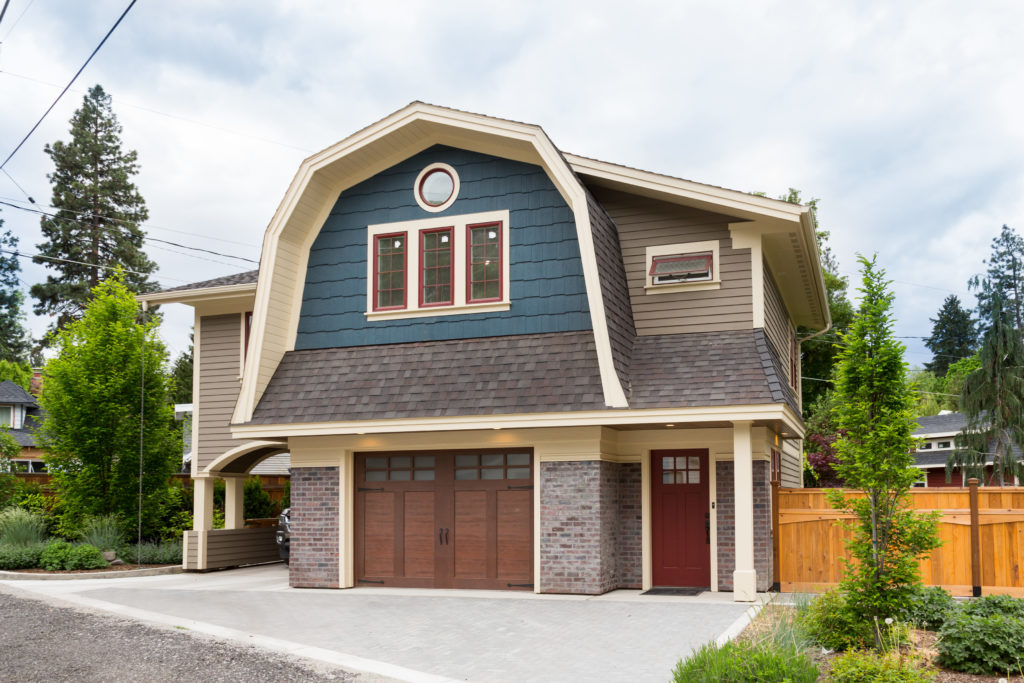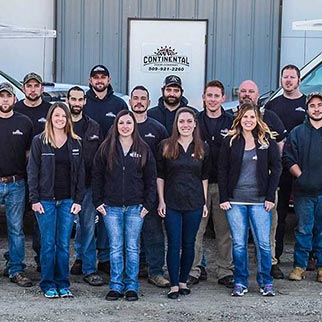Common Problems With Garages Underneath a House
Garages Underneath Houses
There are many factors to consider when you are building or buying a home. The garage is one important feature that many homeowners tend to overlook.
To save space, some homes feature a basement garage rather than a typical ground-level style. But what are the advantages and disadvantages of houses with basement garages?
Request An Estimate
What Is a Basement Garage?
A basement garage or tuck under garage is exactly what it sounds like: a garage that is fully or partially under the upper level of a house. Basement garages are common in houses situated on hills as well as in areas where plots of land are generally smaller and space needs to be used efficiently.
Garage Under the House: 3 Problems You’ll Run Into
Before you commit to plans for a garage under a house, you should consider some of the disadvantages:
1. Hearing the Garage Door Open and Close
When a basement garage door is opened and closed, the sound can usually be heard in the room above the garage. If the room is a dining room or kitchen, this might not bother you — but a house with a bedroom above the garage wouldn’t be ideal, especially if someone in the house frequently has to leave early in the morning or late at night.
2. Carrying Groceries Up the Stairs
For many homeowners, carrying groceries up the stairs is the most significant inconvenience of a house with a garage in the basement. While some appreciate the extra exercise, it can be a bit of a hassle if you need to make frequent trips in and out of the house.
3. The Room Above the Garage May Be Colder in the Winter
If the garage is not insulated correctly, the upper room in your home may be noticeably colder in autumn and winter. This can result in higher utility bills as well. An insulated garage door can help to alleviate this issue.
4. Resale Value May Be Lower
For these reasons, the resale value of a house with a tuck under garage may not be as high as it would be otherwise. Even if you don’t mind the idea of a basement garage, you may want to consider how it will affect your return on investment if you eventually sell the home.
2 Benefits of Basement Garages
However, a basement garage is not without its advantages. Here are a few benefits of a basement or tuck under garage:
1. They’re Aesthetically Pleasing
A ground-level garage isn’t ideal for some styles of homes. A tuck under garage is less likely to pull focus from the architecture of the rest of your home.
2. They Don’t Take Up Much Square Footage
If your home is on a property without much square footage to spare, a basement garage is a great solution for storage that doesn’t take up too much space.

Upgrade Your Home With Continental Door
If you have plans to put a finished garage under your house, contact Continental Door for high-quality, professional garage door services and expertise. We offer premium Clopay® insulated garage doors and advanced opening systems that can help mitigate the noise and heating and cooling issues of a tuck under garage design. Our products are also designed to complement any house for a boost in curb appeal and market value.
Give us a call at 509.921.2260 or visit us in Spokane Valley to learn more. Or, if you’re ready to take the next step, request a free estimate or schedule service today!
Contact Us3 Signs You Need to Replace Your Dock Leveler
Signs it’s Time to Replace Your Loading Dock Leveler
When your business operates out of a loading dock, you know just how important it is to perform regular loading dock maintenance. Doing so is an investment in safety for your most valuable asset — your personnel.
But how do you know when it is time for dock leveler repair or replacement?
What Is a Dock Leveler Used For?
Levelers are used in buildings with truck-level doors. In terms of safety, a dock leveler is one of the most essential parts of a loading dock.
A dock leveler is a height-adjustable platform generally made from a large metal plate. The dock leveler bridges the gap between the loading dock and the truck. It can be raised or lowered depending on the height of the truck’s bed.
While a dock leveler is a sturdy piece of equipment, it can be worn down over time when subject to heavy forklift traffic. Dock leveler repair can help, but replacement is necessary from time to time.
Reasons for Dock Leveler Replacement
The following signs indicate that it may be time to replace a dock leveler:
1. The Components are Warped
The weight and stress of constant forklift traffic can warp elements of a dock leveler over time. If the dock leveler is visibly warped, repairs will probably not be effective — it is most likely time for a replacement.
2. You Want to Upgrade the Door or Bay
There may be a number of reasons to upgrade the door or bay of a loading dock. Maybe the components are damaged or outdated, resulting in a decrease in efficiency. If this is the case, the dock leveler is one of the parts of a loading dock that should probably be replaced.
3. The Leveler Is Outdated, Unsafe or Fails to Meet Leveler Requirements
A dock leveler can be outdated or unsafe for numerous reasons. Even with regular loading dock maintenance and dock leveler repair, this device can wear down over time like any other equipment. An unsafe dock leveler can result in damage to forklifts and cargo as well as serious injuries to personnel. Replacement of an unsafe dock leveler protects your business’s most valuable assets.
When to Upgrade a Dock Leveler
The reasons for dock leveler repair and replacement come down to two main factors: safety and efficiency. Ideally, you’ll upgrade the dock leveler before any safety concerns arise.
Monitoring efficiency can be a useful way to determine when it is time for an upgrade. When a dock leveler is outdated or unsafe, operators require more hands-on time with equipment to ensure safety. Over time, this results in more downtime and a decrease in production.
If you notice that production is gradually getting lower, it may be time to upgrade the dock leveler.
How Often Should a Dock Leveler Be Serviced?
The type of leveler used in your loading dock can impact the amount of service it requires. Some designs just aren’t built to last as long as others.
Mechanical levelers generally last five to seven years, while hydraulic levelers might last 10 years.
Yearly service is the best way to ensure that a dock leveler is in proper working order.
Contact Continental Door Today
The leveler is one of the most essential parts of a loading dock, so dock leveler repairs and replacements are important investments in the future of your business’s operations. If your leveler is warped, worn or part of an outdated bay, trust Continental Door to perform the expert repair or replacement you need to keep your business moving.
Contact Continental Door for high-quality and professional services and expertise. We are proud to serve homeowners and businesses in the Greater Spokane area. Request an estimate or service today.

